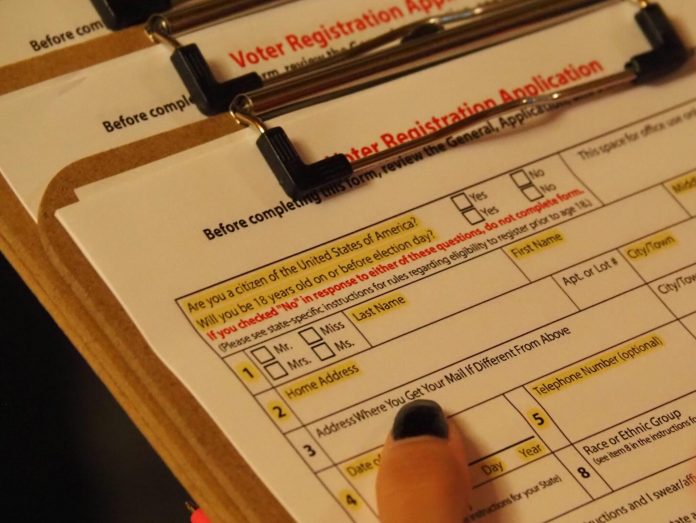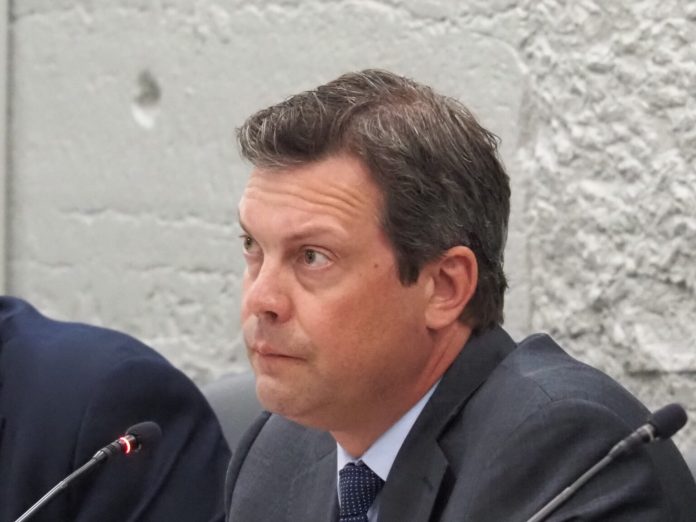|
||||||||||||||||||||||||||||||||||||||||||||||||||||||||||||||||||||||||||
|
HOT JOBS
Christmas in New Harmony
410 Main St. | New Harmony, IN | 6 PM
This little town brings back the warmth of an old-fashioned Christmas where you’re walking from shop to shop, enjoying the sounds of carolers in the streets and sampling the tasty treats of the holidays! Our small town Christmas Parade on Saturday morning is not to be missed, and there is “Candyland” and the hot chocolate bar for the kiddos. Our vendors provide everything from home baked goodies to incredible works by skilled artisans that make exquisite gifts for those on your list. There is also a Holiday House Tour that highlights the diversity of architectural styles in this beautiful and historic town.
Indiana officials say review found 21 noncitizens voting in state
By Tom Davies ,Indiana Capital Chronicle
State officials say a federal agency review found 21 noncitizens have cast ballots in Indiana elections, along with 165 noncitizens who registered to vote in the state.
Those figures were included in an announcement Wednesday from the offices of Attorney General Todd Rokita and Secretary of State Diego Morales about the settlement of a lawsuit in which they sought to force the U.S. Department of Homeland Security to verify the citizenship of more than 585,000 registered Hoosier voters.
It was not clear how many of those voter registrations had been reviewed by the federal agency and when the illegal voting was alleged to have occurred.
In 2024, Indiana had 4.8 million registered voters and just under 3 million, or 62%, voted in that year’s general election. The Hoosier state has one of the lowest voter turnouts in the country.

Rokita and Morales, both Republicans, filed the lawsuit in April, seeking to force federal review of the voter list after the agency did not do so during then-President Joe Biden’s administration when first requested in October 2024 — just weeks before that year’s presidential election.
Rokita said in a statement that the settlement “delivers the federal access we’re entitled to under law, allowing the Secretary of State to swiftly remove ineligible voters from the rolls and fortify our system against future risks.”
“From day one, many individuals dismissed our work as a ‘witch hunt’ — but the facts speak for themselves: non-citizen voting is real here in our state, and even one illegal ballot undermines the trust we are told to have in our election processes and even the Republic itself,” Rokita said.
Rokita’s office did not answer questions from the Indiana Capital Chronicle about how it had confirmed the instances of noncitizens registering to vote and casting ballots — and whether any legal action against those people was being sought.
The announcement said the ballots had been wrongly cast in “recent elections” but did not provide additional information.
Morales spokeswoman Lindsey Eaton said the review “includes voters in 2024 and past elections. It’s based on statewide voter history.”
It is illegal under both Indiana and federal law for noncitizens to vote in elections.
Actions criticized as voter intimidation
Voting-rights advocates previously denounced as attempted voter intimidation the request from Rokita and Morales for review of the nearly 600,000 registrations by the U.S. Citizenship and Immigration Services — which is housed within the homeland security agency.
The Chicago Lawyers’ Committee for Civil Rights, which is representing several Indiana groups in legal challenges to state election law changes, criticized the actions by Rokita and Morales.
“Hoosiers who have become U.S. citizens are needlessly harmed by these efforts. This preliminary information from USCIS has not been verified,” the organization said.
Eaton said the secretary of state’s office “believes information received from USCIS is accurate and we will provide more information concerning referrals to law enforcement in the near future.”

That requested review covered about one in eight people on Indiana’s voter rolls, involving those who registered without providing a state-issued form of identification.
Indiana was among four Republican states agreeing in the lawsuit settlement filed Friday to help the Trump administration gain access to state driver’s license data through a nationwide law enforcement computer network seeking out alleged noncitizen voters.
Under the agreement with Florida, Indiana, Iowa and Ohio, the U.S. Department of Homeland Security is required to continue its development of a program capable of scanning millions of state voter records for instances of noncitizen registered voters.
Morales announced in September that his office had identified a noncitizen living in Vigo County who alleged had registered to vote in 2018 and cast ballots in six elections.
That case was referred to county and federal prosecutors, but it was unclear whether any legal action has been taken as those offices did not immediately reply Wednesday to messages seeking an update.
Trump, Hegseth and the triumph of turpitude and incompetence
-
It is hard to know which is the more impressive dubious achievement of President Donald Trump’s second administration.
The moral turpitude?
Or gross incompetence?
Each can make a strong claim for priority.
On balance, though, we must give the edge to moral turpitude.
Trump and his intellectually and ethically challenged Secretary of Defense Pete Hegseth have managed to work themselves and the country they’re supposed to serve into a predicament.
The source of that predicament is the attacks they launched on Venezuelan boats in the Caribbean. The president and his pet secretary have asserted that the boats were engaged in drug trafficking, but they have provided no evidence to support their assertions.
Worse, in one of the attacks, U.S. forces—quite possibly on Hegseth’s orders—killed two survivors who clung to debris in the water after the bombing.
Hegseth’s story about his role in this has changed about as often as a kaleidoscope changes color.
Initially, he was boastful about the killings, as if ending the lives of two people bobbing helplessly in the sea were an act of real machismo. He asserted that—in keeping with the Trump administration’s dim-bulb decision to try to rename the Defense Department the “War Department”—the days when the U.S. military would be anything less than bloodthirsty in battle were over.
Hegseth’s chest-thumping decelerated quite a bit, though, when concerned Democrats and Republicans pointed out that killing people who can no longer pose a threat, even in a combat situation, violates the rules of war and international law. Their concerns prompted bipartisan investigations into the incident in both houses of Congress.
Hegseth tried to backpedal by blaming, in turn, the “fog of war” and then a subordinate for the decision.
The problem with the secretary’s first attempted evasion is that there has been no declaration of war. If a war were to result from this, a strong—in fact, an almost irrefutable—case could be made that the United States was the aggressor in the conflict.
Even if there were a war, what the United States did on Hegseth’s watch would be a problem. Part of the reason that we Americans have abided by both rules of war and international law—which, by the way, we helped fashion—is that doing so protects our citizens around the world and serves as justification for the use of our military might in the event that our citizens are assaulted or killed.
It will be hard for this president to invoke those rules and that law if, through him and his incoherent secretary of defense, we say that we do not feel bound by those same rules and law.
This tough-guy-by-proxy posturing by Trump and Hegseth only serves to make Americans traveling around the globe less safe.
Worse, other nations may not accept the Trump administration’s contention that it can unilaterally dispense with rules and laws that have been developed and agreed upon over centuries.
Those other nations may decide that—in the most charitable interpretation—the United States committed a war crime.
A less charitable interpretation—given that we aren’t at war—is that we committed murder.
That’s why Hegseth, following his boss’s example, has tried to find a scapegoat, an underling he can blame for the transgression.
But there’s a problem there, too.
Trump and Hegseth have—loudly, stridently, angrily—been asserting that U.S. Sen. Mark Kelly, D-Arizona, and five other Democratic members of Congress who are veterans themselves are guilty of sedition by saying that U.S. military personnel don’t have to obey illegal orders.
Trump’s and Hegseth’s contention has been that members of our armed forces have to obey all orders, legal or illegal, constitutional or unconstitutional.
If so, that relieves subordinates of any legal responsibility for their actions and kicks it all upstairs. If soldiers don’t have the legal right to refuse an illegal order—and, to be clear, both the oaths they take and the Uniform Code of Military Justice say they do have that right—then the sole responsibility for any unlawful act by the military lies at the top.
Hegseth and Trump indict themselves with their own half-fast attacks on Kelly and other veterans.
So, where could this leave them?
Well, in the worst-case scenario, their defense against murder charges will be that they’re really just war criminals.
Yes, we’ve got to give moral turpitude the win.
John Krull is director of Franklin College’s Pulliam School of Journalism and publisher of TheStatehouseFile.com, a news website powered by Franklin College journalism students. The views expressed are those of the author only and should not be attributed to Franklin College.
Republican senator against Indiana redistricting not seek reelection
Republican state Sen. Kyle Walker won’t seek reelection next year, making him another opponent of the proposed GOP-redraw of Indiana’s congressional maps who will be leaving the Legislature.
Walker announced Wednesday that he would complete his Senate term through the November 2026 election.
Walker’s Senate District 31 is one of the state’s few politically close Senate districts, covering the northeastern corner of Indianapolis and the Fishers area in Hamilton County. He won the 2022 election with 55% of the vote.
Walker’s statement did not mention the congressional redistricting that’s been demanded by President Donald Trump, who has berated several Republican state senators who’ve come out against the redraw.
“I remain fully committed to serving with the same focus and energy for the remainder of my term, and to ensuring a smooth transition for the district’s future leadership,” Walker said in his statement. “But I also want to make this announcement now, in advance of the February filing deadline, so that potential candidates have some time to consider their interest and ability to serve this district.”
Walker is among about a dozen Republican senators to publicly oppose redistricting. Their opposition leaves the fate of the redistricting push uncertain even though Republicans currently hold 40 of the 50 Senate seats as about a dozen GOP senators have not yet revealed their stance.
Walker joins Sens. Eric Bassler of Washington and Greg Walker of Columbus as Republican redistricting foes who won’t seek reelection in 2026.
Kyle Walker announced his redistricting opposition last month despite his close ties with a leader of a pro-redistricting group and being a member of the 24-person Indiana Republican Party State Committee as the party’s 7th Congressional District vice chair.
“I’ve spent the past several months listening closely to my constituents on mid-decade redistricting,” Walker said at the time. “With 93 percent opposed, and as their voice in the Indiana Senate, I’ll be voting no.”
A Walker spokesman told the Indiana Capital Chronicle that Walker has resigned from his position as executive vice president of MO Strategies, a political consulting firm where he worked for several years that is led by Marty Obst.
Obst is the chair of Fair Maps Indiana, a nonprofit group that launched a six-figure advertising effort targeting undecided Republican senators pushing for their support of redistricting. Obst served in senior leadership roles in Trump’s 2016 and 2020 presidential campaigns and was a senior political adviser to former Vice President Mike Pence.
Walker alluded to the job change in his statement Wednesday without giving any details.
“As some of my colleagues, friends and family know, this is a decision I’ve wrestled with for several months,” his statement said. “I am forever grateful for having the opportunity to represent the people of our district. This, however, is a season of change for me. Looking forward, I have also decided to start a new chapter in my professional career.”
Walker campaign spokesman Luke Thomas said Walker planned to continue as a state Republican committee member.
“He and Marty are great friends, and he’ll continue working with him and the team long enough to ensure a smooth and successful transition,” Thomas said.
Walker’s announcement cited key accomplishments from his Senate tenure, including a change the state’s local income tax distribution formula to ensure the city of Fishers receives a more equitable share of local income tax revenue. He also created a Sports and Tourism Bid Fund to help communities across Indiana access resources to host major events to stimulate local economic growth.
This story has been updated with Walker resigning from a political consulting firm.
While Republicans focus on political advantage, critics say map disenfranchises Hoosiers
- Over and over, critics of Indiana House Republicans’ proposed new congressional map were met with the same phrase from Rep. Ben Smaltz, R-Auburn, at Tuesday’s hours-long hearing of the House Elections and Apportionment Committee.
“We have drawn these maps to create a Republican political advantage.”
Smaltz authored House Bill 1032, which would allow lawmakers “to amend congressional districts at a time other than the first regular session of the general assembly convening immediately following the United States decennial census”—or, to redistrict the state ahead of the 2026 midterm election, a major goal of the Trump administration.
After nearly six hours of testimony, Smaltz’s bill would pass committee over the no votes of four Democrats and a single Republican, Rep. Tim Yocum, R-Clinton. The full House was then scheduled to take up the redistricting issue just 20 minutes later.
Racially gerrymandered maps?
Smaltz repeatedly told Democratic members of the committee that Republicans, when creating their map, had taken no other information into account than winning their party all nine of Indiana’s congressional seats. Most notably, he said they had disregarded the racial makeup of their proposed new voting districts, which drew incredulous ire from his colleagues across the aisle.
“So you’re OK with having racially gerrymandered maps because your priority is for political advantage?” asked Rep. Cherrish Pryor, D-Indianapolis. “In order to comply with the Voting Rights Act, why would you not look at the racial makeup of the districts?”
“That will be something the courts will decide, if we’ve done this appropriately,” Smaltz said.
In introducing his bill to the committee, Smaltz characterized his party’s redistricting efforts as consistent with the role the Founding Fathers envisioned for the states, as an appropriate response to movements taking place in other states like Texas and California, and as a necessity to preserve Republican power at the national level.
Rep. Matt Pierce, D-Bloomington, bottom left, repeatedly requested the scheduling of additional public hearings in the state’s congressional voting districts but was denied by committee Chair Timothy Wesco, R-Osceola, who pressed on with scheduled business.
Screenshot by TheStatehouseFile.com.
He also said a string of doxxing, bomb threats and swatting attempts aimed at apparent hold-outs in the legislature had not influenced his or his colleagues’ decision to push the redistricting effort forward—this despite the Senate earlier indicating it does not have the votes.
“Would you agree there’s pressure on the caucus?” asked Rep. Matt Pierce, D-Bloomington, who several times would request to schedule community hearings and be denied by the chair.
“That’s not going to change my mind,” Smaltz answered, saying he had spoken personally with both President Donald Trump and Vice President JD Vance and found them “very professional.” He also said he and his family had received death threats.
“It’s not an unusual part of the process,” he said.
Rep. Ben Smaltz, R-Auburn, authored House Bill 1032, which would redistrict the state early, a major goal of the Trump administration.
Screenshot by TheStatehouseFile.com.
Many testifiers took exception to that statement, as they objected to other aspects of Smaltz’s bill, including its limits on how the courts might be allowedto respond.
Democrats on the committee most focused on the map breaking apart minority communities—for example, in Marion County, split into four separate districts—and threatening the seat of Indiana’s sole African American representative, Andre Carson. They said the map could violate the 1965 Voting Rights Act.
“We did not look at any other information than what created a political advantage,” Smaltz replied.
Democrats questioned why district maps considered “almost perfect” four years ago are suddenly unacceptable and why Republican lawmakers are choosing to focus on redistricting rather than issues more pressing to everyday Hoosiers—for example, rising utility rates. They also quarreled with committee Chair Timothy Wesco, R-Osceola, about the time they were taking to press the bill’s author.
“Everything has been done in secret and at the last minute,” said Rep. Sue Errington, D-Muncie, which on the new map finds itself split from the rest of Delaware County and joined with communities on the Michigan border. “The public has been kept out of the conversation.”
Nevertheless, citizens of all stripes—teachers, veterans, retirees, poll workers, immigrants, members of the LGBTQ community—and representatives of many political organizations took turns at the podium for the next several hours, all but a few disagreeing with Smaltz that under his new map, “every vote counts.” Unlike at recent anti-redistricting rallies, opponents sat quietly in the galleries amid a tense atmosphere, no clapping or sign waving.
‘Hoosiers aren’t asking for this’
Marion County Clerk Kate Sweeney Bell.
Screenshot by TheStatehouseFile.com.
Marion County Circuit Court Clerk Kate Sweeney Bell described the “cascading domino effect” early redistricting would have on a complicated voting system involving thousands of people in her county, from updating computers to mailing cards to every single affected voter—and without additional funding.
She called splitting precincts, which the new map does, “an administrative burden like you wouldn’t believe” and said the stress on the system would sow distrust in the process.
“If it passes, there will be chaos,” Sweeney Bell said.
Sue Ellspermann, Republican lieutenant governor under former Gov. Mike Pence and later president of Ivy Tech Community College of Indiana, told the committee, “Hoosiers are not asking for this.”
She was one of a few people to mention the Democratic walkout of 2011 and the political consequences paid by its participants.
“Hoosiers will remember and may well hold you accountable,” she said.
Like Ellspermann, many called on Indiana Republicans to resist pressure from Washington, D.C.
“Hoosiers play fair,” said Megan Robertson of Indiana Conservation Voters. She noted that in the new map, the Statehouse building would fall in a different district than staff favorite Café Patachou across the street.
“The folks who drew these maps, who are apparently in Washington, D.C, and probably have never been to our state, may not know how ridiculous those two facts are, but the people who live here know it,” she said.
Julia Vaughn, executive director of Common Cause Indiana.
Screenshot by TheStatehouseFile.com.
Julia Vaughn, executive director of Common Cause Indiana, said “a loud but small, very self-interested minority” was pandering to the president and ignoring the voices of Hoosiers.
“The only thing that is forcing this in Indiana is the Trump administration and national organizations who see Indiana voters as pawns in their political games,” said Vaughn. “We are not pawns, and our elections are not, and it is an insult to every Hoosier who believes in the democratic process.”
Barbara Tully of the League of Women Voters.
Screenshot by TheStatehouseFile.com.
Barbara Tully of the League of Women Voters of Indiana implored lawmakers to stand up to outside influence. “Integrity still has a place in our democracy even in the face of intense pressure,” she said.
A citizen in a rainbow sweatshirt was perhaps more blunt when he clucked like a chicken at the Republicans sitting in the front row of the chamber.
Failed amendments
Also blunt was Rep. Robin Shackleford, D-Indianapolis, speaking during the public testimony phase of the meeting. She called Republican redistricting efforts a “Hitler-type plan of control.”
“The impact of this bill will be crippling to the Black and brown community,” she said.
Denise Abdul Rahman of the Indiana NAACP.
Screenshot by TheStatehouseFile.com.
Denise Abdul Rahman, speaking for the Indiana NAACP, called the bill racist.
“Racial gerrymandering is a foundational step in ensuring minority voters are left without representation and disenfranchised by a system that reports to be free and fair,” she said. “Racially gerrymandering districts have profound social effects, including reinforcing political disenfranchisement and perpetuating inequality by limiting access to resources like education, housing and health care. …
“Furthermore, these practices can create a political environment where legislators disregard the will of the people and pass discriminatory policies and social issues.”
Five amendments proposed by Democrats, seeking to tie redistricting more firmly to the census or to affordability issues or to require public hearings, all failed along party lines. Before the final vote, Pierce described his sense of sadness at the proceedings.
“What’s happening here is not normal,” he said.
Colleen Steffen is executive editor of TheStatehouseFile.com, a news site powered by Franklin College journalism students. She worked as a newspaper reporter and editor for more than 13 years and is now in her 10th year teaching college journalists.
Deadline Approaching: for Celebration of Leadership
There’s still time to submit your nomination for Celebration of Leadership — but the deadline is almost here! Nominations close tomorrow, December 5, at 11:59 PM.
If you know a person, project, program, business, or organization making a positive impact in our region, we would be honored to help you celebrate them. Whether they’re strengthening neighborhoods, supporting youth, advancing equity, innovating in education, uplifting the arts, or quietly leading with compassion — your nomination matters.
Submit your nomination at: col.leadershipeveryone.org
HOT JOBS
|










